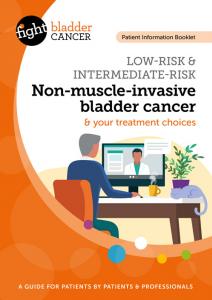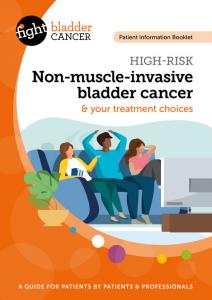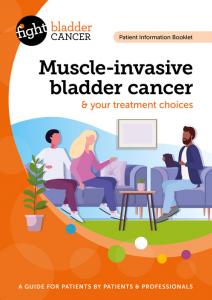Building your knowledge
If you’ve just received a diagnosis of bladder cancer or are waiting for confirmation, you’re likely to be processing the news and thinking about what this means for the weeks and months ahead. We'll be honest, there’s a lot to learn, new words to understand and people to meet who will be involved in your care. We can help you build your knowledge so you can make the best decisions for the journey to come. The most important thing to remember is that you are not alone. We are here to support you in whatever way we can.
As well as a helpline and other support services, you can find more information in our range of patient information booklets about the different types of bladder cancer and types of treatments, which feature patient tips from those living with bladder cancer. (See link at the bottom of this page).
Receiving a diagnosis
First things first: it is normal to be scared. No matter what the doctors have said to you, your first reaction is likely to be fear. It happens to all of us when we are first diagnosed. It is also normal for your closest loved ones to be in the same state of shock and concern. Often their worries are even more intense than yours as they will feel totally helpless at the beginning.
The second thing is that it is important that you get the right treatment straight away. Yes, people do die from bladder cancer but it very much depends on the type of bladder cancer and how aggressive it is. The right treatment will give you the best chance of surviving it. You need to find out the details of your particular cancer.
Getting the right knowledge
To make the informed decisions that will be necessary, you will need to understand what your diagnosis means and what treatment options are open to you.
While your medical team will explain things to you, most people need time to reflect on all this new information, and look for more guidance from other sources. That can be very valuable, but do remember:
- a bladder cancer diagnosis can mean many things and is as individual as you are
- always check that the source of the information you are looking at is a reliable one, such as a nationally respected institute or organisation like Fight Bladder Cancer or Cancer Research UK
- discuss what you have found with your clinical nurse specialist (CNS) or medical team.
This is personal
Cancer has one name but a vast number of subcategories. Bladder cancer alone subdivides into muscle-invasive and non-muscle- invasive, and has different stages, grades and types. There are considerable differences between muscle-invasive and non-muscle- invasive bladder cancer as far as the treatments and prognosis are concerned.
You can find the most important questions to ask your CNS (Clinical Nurse Specialist) and urologist in our booklets about the different types of bladder cancer.
Remember that every person is different — physically and mentally — so what is right for one person may not be right for another. Investigate, ask questions, talk to people and listen to their viewpoints, then make the best decisions for you
How did we get here?
You may have found blood in your wee or had other symptoms that caused you to go to your GP. You will then have gone through tests and investigations to get a diagnosis of bladder cancer.
Generally, after this initial diagnosis of a bladder tumour, the urologist will have suggested that the patient have a procedure in the hospital to examine the bladder more completely under anaesthesia (general or spinal) and to remove the tumours, if possible. The doctor may refer to this procedure as a TURBT. The TURBT may be followed by chemotherapy bladder wash, filling the bladder with a chemotherapy solution — which can reduce the chance of the cancer recurring — then draining it off after an hour or two.
Urologists typically send a sample of the cancer tissue to a pathologist for a biopsy — an examination of the tissue under a microscope.
The pathologist, who specialises in examining tissue, will examine the sample under a microscope and confirm the type of bladder cancer and whether it has grown into the bladder wall.
At this stage you may be told that you have muscle-invasive or non-muscle-invasive bladder cancer and what stage, grade and type it is.
The next consultation
The findings from the pathologist, along with results from imaging such as CT scans, will be sent to your urologist so that as much as possible is known about the cancer. A team of healthcare professionals, known as the multi- disciplinary team, will then decide if further treatment is necessary and what that treatment should be, using national and international guidelines. They will explain all this to you at the next consultation.
Questions to help you understand your cancer
Keep in mind that everyone is different. Some people want to know every minute detail of what is likely to happen; others prefer just to stick to the basics. That's okay, but remember that the doctor or consultant cannot read your mind so they don't know how much detail you want to hear unless you tell them. It is up to you to ask the questions.
To begin with, these basic questions will help you understand your specific cancer.
- what type of cancer do I have?
- what do you mean by muscle- invasive, stages and grades?
- what are my treatment choices
- which treatments do you recommend for me and why?
- what are the expected benefits of each kind of treatment?
- what are the risks and possible side-effects of each treatment?
- who will be part of my medical team?
- how will treatment affect my normal activities?
- how will it affect my quality of life?
- how often do you treat patients in my situation?
- can I speak with a patient who has gone through this type of treatment?
As you get more confident and learn and understand more, you will begin to add your own questions to the list.
If you hear unfamiliar words or terms, take a look at our glossary for an explanation.
Take your time to evaluate what you are told as you are likely to be in shock for a while.
Support for you
Please remember that you can contact us at any time for support, whether you are a patient or care for someone who is.
Our helpline is open from 09.00–16.30, Monday to Friday. There‘s an answerphone if we‘re busy, but we will call you back as soon as we can. Call 01844 351 621 or email info@fightbladdercancer.co.uk
Talking to other people who have had the same tests, investigations and diagnosis can help. Our private online forum on Facebook is available 24/7, 365 days a year. Find out how to join and other ways you can talk to patients and carers via our getting support page.
More information
You can download copies of our relevant Patient Information Booklets below. If you would like a free copy sent to you by post or email, add your details to our booklets order form and we'll get them to you.
Get in touch
We’ve tried to make the information on this site as accurate as possible. Whilst we have support from medical professionals to review the general medical content of this site, please remember that only your medical team can give you specific advice about your symptoms or illness. Fight Bladder Cancer is a registered Charitable Incorporated Organisation in Scotland (SC051881), England and Wales (1198773), and was initially established as an unincorporated charity in England and Wales (1157763). It also operates in Northern Ireland.


